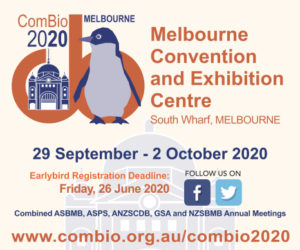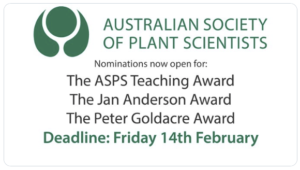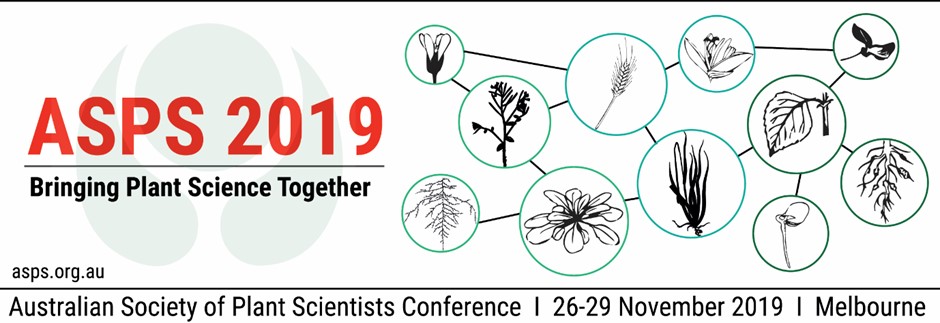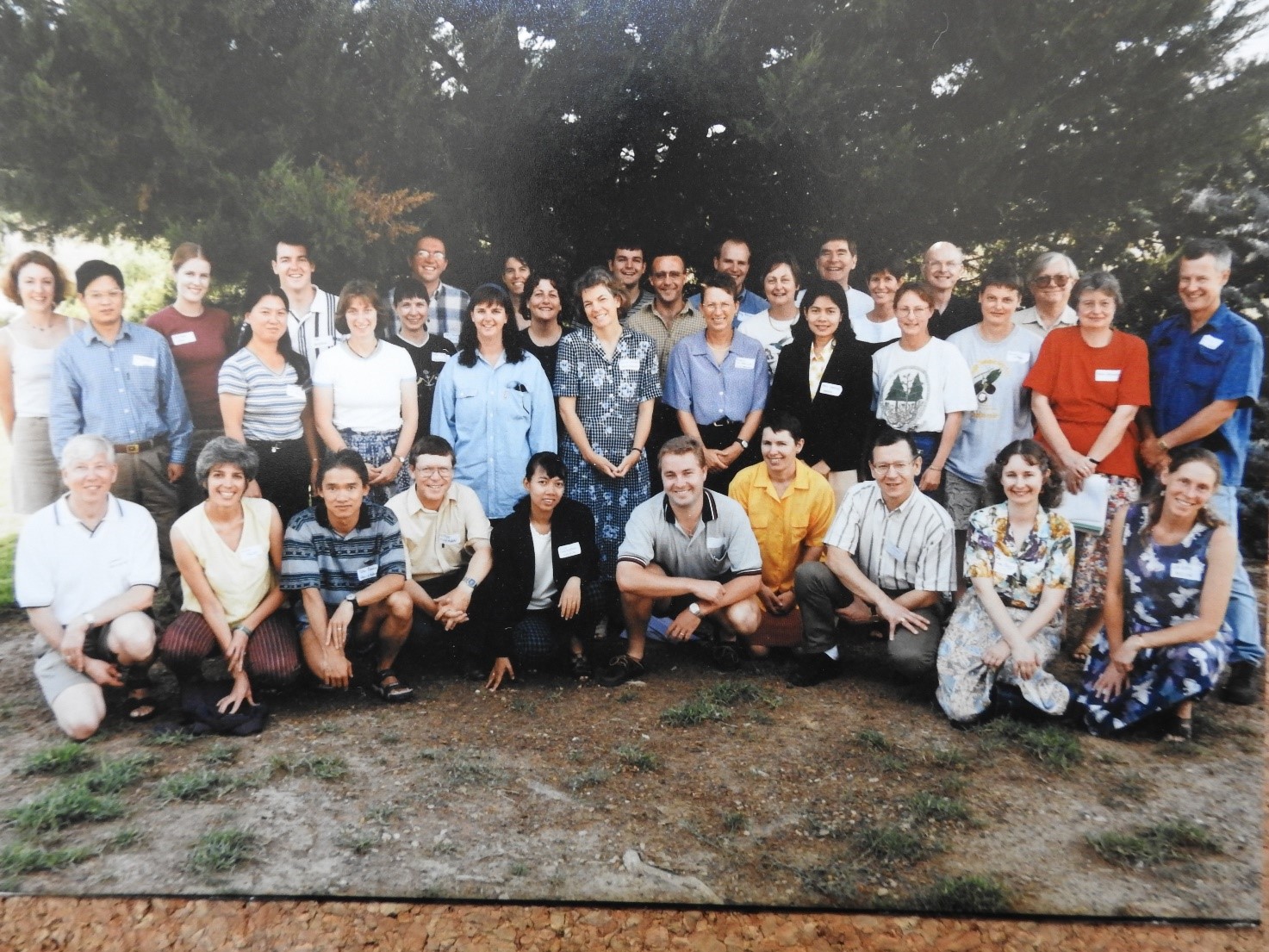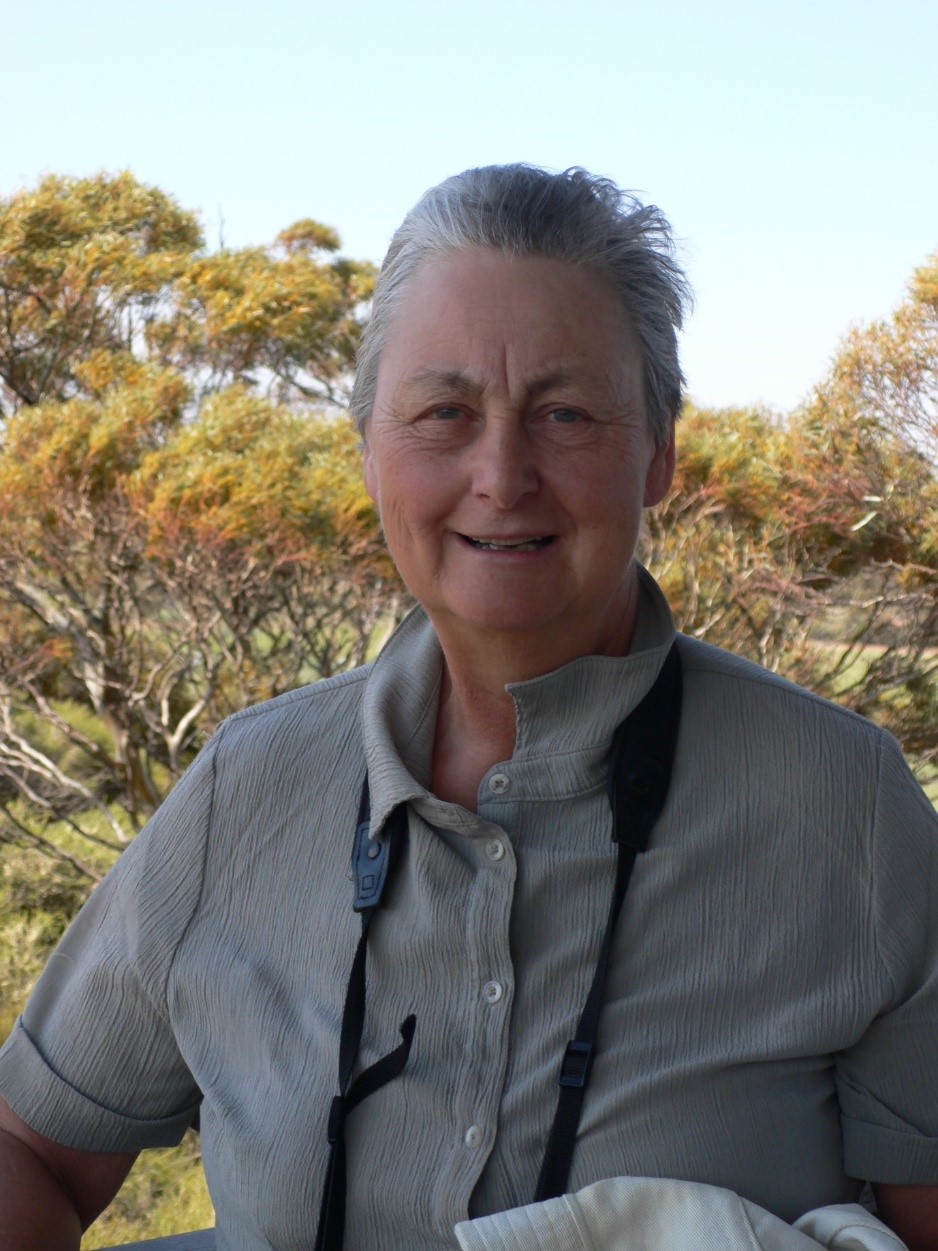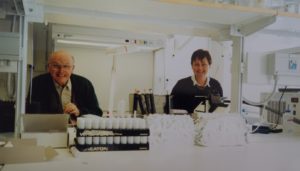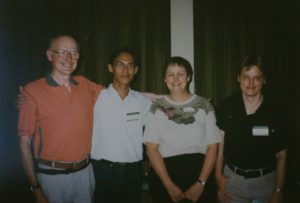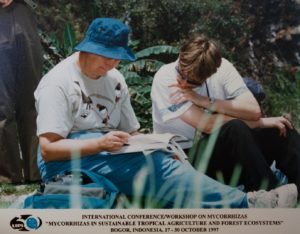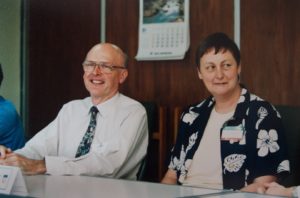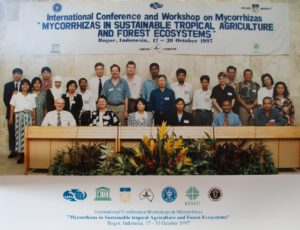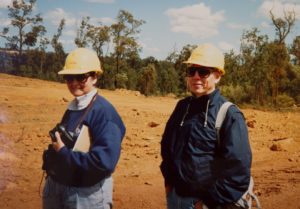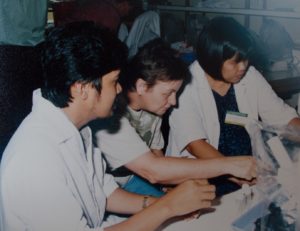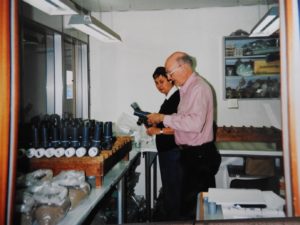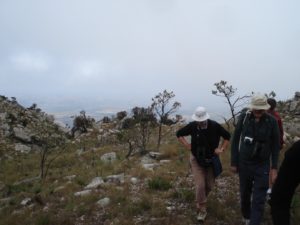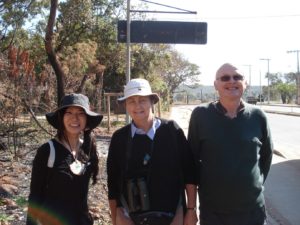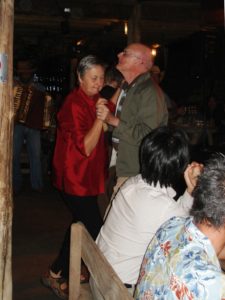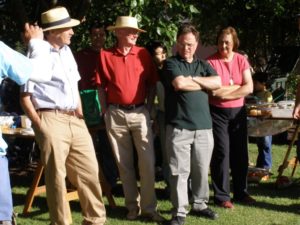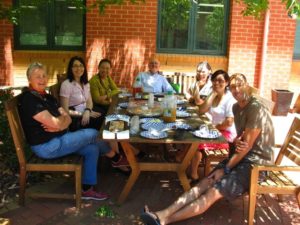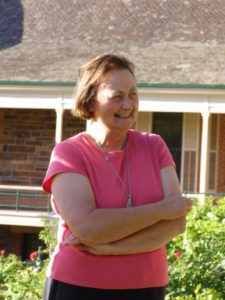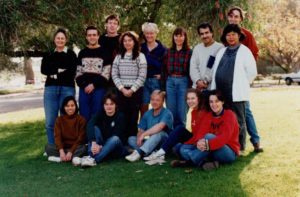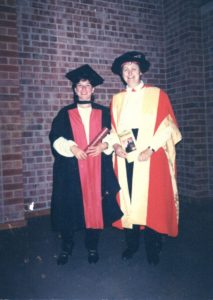- About
- Members
- Join
- Member log in
- Membership Renewal
- Member directory
- Life Members
- ASPS Life Member Professor Graham Farquhar
- ASPS Life Member Associate Professor Hendrik (Hank) Greenway
- ASPS Life Member Dr Marshall (Hal) D Hatch
- ASPS Life Member Dr Paul E Kriedmann
- ASPS Life Member Dr Mervyn Ludlow
- ASPS Life Member Emeritus Professor Rana Munns
- ASPS Life Member Conjoint Professor Christina E Offler
- ASPS Life Member Professor (Charles) Barry Osmond
- ASPS Life Member Emeritus Professor John W Patrick
- ASPS Life Member Dr Joe Wiskich
- Corresponding Members
- Elected Fellows
- Events
- Awards & Funding
- Employment
- Publications
- Research
- Teaching
- Menu
December 2019 Phytogen
15 December 2019
Welcome to the last edition of Phytogen for 2019. We enjoyed seeing you at our annual conference last month. La Trobe University was delighted to host the Australian Society of Plant Scientists conference from 26 to 29 November in the stunning Centre for AgriBioscience (AgriBio) in Melbourne. Over 200 participants attended the meeting including both national and international delegates from our wonderfully diverse community of plant scientists, agronomists, nutritionists, educators, industry and government representatives.
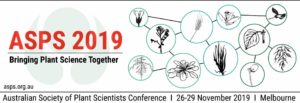
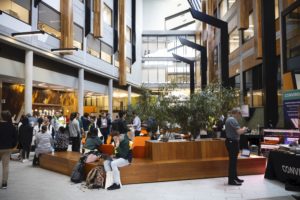
The meeting kicked off with a student networking lunch where students gained stickers each time they engaged each other in conversation. Extra stickers were awarded by chatting with the international keynote speakers including Prof Nicolaus von Wiren and Dr Fabian Pfrengle (Germany), Prof Jianping Hu, Prof Dan Szymanski and A/Prof Julie Law (USA), Prof George Bassel (UK) and Prof Mao Long (China). Congratulations to Fiona Kang who collected the most stickers and the student networking prize! The first session also highlighted the amazing work of the Society’s students with ASPS student representatives Mr Yingxuan Ma and Mr Ronan Broad undertaking chairing duties. The great atmosphere continued with informative and entertaining talks by nutritionist Prof Jennie-Brand Miller and the ‘poster teaser’ presenters before relaxing at the Welcome dinner and catching up with friends and colleagues.
The meeting continued with a packed agenda and some new themes including insights into medicinal agriculture and emerging and transformational technologies in genomics and phenotyping. The program also featured excellent presentations from ASPS award winners’ Dr Monika Murcha (Jan Anderson Award), A/Prof Sigfredo Fuente (Teaching Award), Prof Ros Gleadow (JG Wood Award) and Dr Simon Williams (Peter Goldacre Award).
A shared biotic intera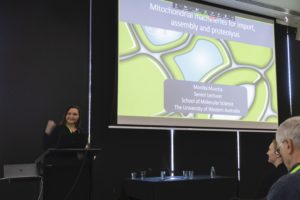 ctions session on the final day with the Australasian Plant Pathology Society Conference celebrating their 50thanniversary was also a highlight. The Grains Satellite meeting held thereafter gathered researchers and breeders from across the country and focussed on the pipeline to delivering enhanced grain yield in addition to quality traits relating to food applications and nutrition.
ctions session on the final day with the Australasian Plant Pathology Society Conference celebrating their 50thanniversary was also a highlight. The Grains Satellite meeting held thereafter gathered researchers and breeders from across the country and focussed on the pipeline to delivering enhanced grain yield in addition to quality traits relating to food applications and nutrition.
Dr Monika Murcha (Jan Anderson Award)
Social events at ASPS 2019 included tours of the La Trobe Wildlife Sanctuary, Posters and Drinks sessions and a Society dinner at the new La Trobe Sports Park pavilion. Across the week there was a fantastic atmosphere in AgriBio with a real sense of community and collaboration. The meeting was a great opportunity to share knowledge and resources, generate new ideas and identify avenues for translation. A huge thanks to all those who made it a success, especially our wonderful undergraduate, Honours and PhD student volunteers and poster judges.
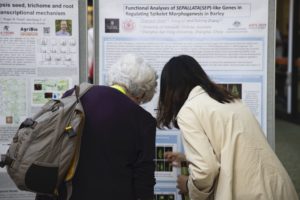
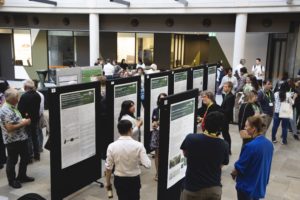
In addition, we extend our sincere thanks to the event sponsors including GRDC, BioPlatforms Australia, Agriculture Victoria, Conviron, Laftech, Agilent, Cann Group Limited, ARC Centres of Excellence Plant Energy Biology and Translational Photosynthesis, GlycANZ, La Trobe Institute for Agriculture and Food (LIAF), ARC Medicinal Agriculture Hub and Department of Animal, Plant and Soil Sciences at La Trobe, Australian Plant Phenomics Facility and the journal Plants.
We look forward to seeing you again next year at ComBio at the Melbourne Convention Centre (29 September to 2 October, 2020, website www.combio.org.au/combio2020/) and bringing our wonderful society of plant scientists closer together.
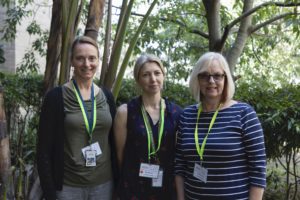
Dr Kim Johnson and Dr Monika Doblin with Professor Kathleen Soole (ASPS President) on behalf of the ASPS 2019 Meeting Organising Committee.
Photos taken by William Salter.
During the AGM and in Novembers Phytogen, we outlined how you can vote for state representatives. If you haven’t yet voted, you can ahead of ComBio2020. Go to: https://www.surveymonkey.com/r/8KH6FV5
We need 2/3 rd of financial members to vote. If you would like to be part of the discussion click HERE. To renew your membership so you are a financial member click HERE. You can request a new password be sent to your registered e-mail address.
We also want to acknowledge Janet Wheeler (La Trobe) and John Evans (ANU) awarded life members. Thank you for all the work you do for our society. Catch the buzz with lots of ARC funding for plant science and our ASPS Plant Science Education Representative Dr Beth Loveys with Dr Karina Riggs has won the University of Adelaide Stephen Cole the Elder Award for Excellence and the Vice Chancellor and President’s Award for Excellence. She writes for us below.
Like all higher education institutions, the University of Adelaide awards excellence in a range of different areas of teaching each year. This year I was honoured to be the recipient, along with my colleague and dear friend Karina Riggs, of the University of Adelaide’s premier teaching award, Stephen Cole the Elder Award for Excellence in the category of Leadership, Support and Enhancement of Teaching Practice and also the Vice Chancellor and President’s Award for Excellence.
As Education Specialists, Karina and I work as a team to enhance engagement, learning outcomes and the learning experience for our students at the Waite campus of the University of Adelaide. We achieve this by supporting colleagues to reflect upon their own teaching practices, embrace change and have the courage to adopt new learning and teaching initiatives through a variety of avenues such as; Innovative Teaching @ Waite, Professional Development workshops and co-facilitation of the University wide Community of Practices.
One of the characteristics of our journey from being part-time Associate lecturers to full-time Senior Lectures and leaders in learning and teaching has been the amazing mentors who have guided us along the way. We have always been open to learning from and listening to colleagues not only within our discipline of plant science but also from diverse areas such as medicine, dentistry and the professions.
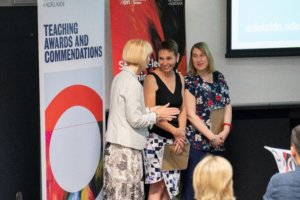 ASPS Plant Science Education Representative Dr Beth Loveys with Dr Karina Riggs from University of Adelaide.
ASPS Plant Science Education Representative Dr Beth Loveys with Dr Karina Riggs from University of Adelaide.
We have led by example by embedding innovative teaching practice in all of our courses and most importantly building authentic working relationships with our students. Our teaching is largely driven by the idea that once the students know that you care they soon care about how much you know (a variation on a statement attributed to Theodore Roosevelt). Being recognised for your contribution to improving the student learning and experience at University is obviously wonderful but more importantly it creates opportunities to continue to promote and support high quality science teaching across the University and more broadly the sector.
Nominations are now open for our 2020 awards. To read more go to: https://www.asps.org.au/awards. Keep up with us on twitter @asps_ozplants
Lastly, we hope you can manage to keep cool over Christmas, our thoughts are with those affected by drought and bushfire. We hope there will be opportunity for recharge, rest and some joy.
 giphy.com
giphy.com
ASPS AGM today. Vote now! ASPS constitutional vote link.
28 November 2019
ASPS members,
The ASPS Annual General Meeting is today. The AGM agenda and reports are available through the ASPS website HERE. https://www.asps.org.au/about/agm
ASPS needs you to vote for a change in constitution to appoint state-based representatives
We need 2/3 rd of financial members to vote so please click on this link today
https://www.surveymonkey.com/r/8KH6FV5
For more details click HERE.
To be part of the discussion click HERE.
To renew your membership so you are a financial member click HERE. You can request a new password be sent to your registered e-mail address.
Financial members are current Ordinary memberships of 1, 2 or 4 years or hold current student membership. Life and retired members are also included in this survey.
Nominate for ASPS Executive Committee or Council
20 November 2019
Dear ASPS members,
As another year passes between meetings our Honorary Treasurer, Rosemary White, comes to the end of her term. We would like to thank Rosemary for all her efficient and hard work during her term in this position and hope she stays an active member.
This means that we are now looking for nominations for this position as part of our new Executive Committee and Council.
If you are interested in this position, please fill the ASPS Council nomination form and email it to secretary@asps.org.au and if you have any questions, please do not hesitate to ask.
Kind Regards,
Kathleen Soole
President ASPS
ASPS constitutional vote link. Vote now!
18 November 2019
ASPS members,
ASPS needs you to vote for a change in constitution to appoint state-based representatives
We need 2/3 rd of financial members to vote so please click on this link today
https://www.surveymonkey.com/r/8KH6FV5
For more details click HERE.
To be part of the discussion click HERE.
To renew your membership so you are a financial member click HERE. You can request a new password be sent to your registered e-mail address.
Financial members are current Ordinary memberships of 1, 2 or 4 years or hold current student membership.
Phytogen-November is ASPS2019 at La Trobe University
10 November 2019
We look forward to seeing you on the 26th November. Follow this link for the schedule.
Below you will read about an upcoming constitutional vote. We want lots of discussion before voting on the day of the AGM (28th November 2019), therefore please join this google group:
https://groups.google.com/d/forum/australian-society-of-plant-scientists
The link will take you to Google Groups. If you have a gmail account, ‘Sign in to view this group’ and then you will be able to post a reply. Otherwise to post, create a gmail account. You can follow steps on this support page for help: https://support.google.com/groups/answer/1067205?hl=en It also details how it is possible to add alternate email addresses if you don’t want to always have to remember a gmail account.
If you wish, you can ‘Subscribe to this group’, you can enter any email address you like, then you will be sent an email for you to confirm your subscription and then you will receive emails when there is activity.
We hope you will join the Google Group to post replies and contribute to discussions related to the ASPS. We also encourage new members and students to participate. If you have difficulties joining the discussion or wish to take up membership, please contact Dr Janet Wheeler (janet.wheeler@latrobe.edu.au) or one of our website and communications team (https://www.asps.org.au/about/website-communications-sub-committee-2)
ASPS AGM and constitutional vote
Dear ASPS members,
The 2019 Australian Society of Plant Scientists Annual General Meeting (AGM) will take place during our annual conference ASPS2019 at 6.00 pm Thursday 28th November 2019 in the Victoria rooms, AgriBio Building, La Trobe University Bundoora, Victoria.
This year at our AGM, I am going to propose a change to the structure of the ASPS committee and Council which will require a change to our Constitution.
I would like to propose that we change from having Discipline Reps to State and Territory-based Reps. As part of this change I would like to propose that a role for the State Reps would be to encourage an informal gathering in their State or Territory, to promote plant science, young scientists and the Society each year. I could envisage that we could provide a small amount of funding each year to the rep to help facilitate this. The process for this can be defined at the AGM.
I am proposing this as I feel that the concept of Discipline-focused reps is somewhat redundant in an era of multi-discipline research. Further, we currently do not have all States represented in our current rep system. For example for 2019, NT, Queensland and Western Australia do not have local ASPS representation. I believe that this change in committee composition would ensure that this lack of representation would not occur and enable ASPS to be promoted more widely, the Society would be more visible and be able to provide more to its members, which in turn would lead to an increase in membership.
Of course we would retain other office bearers such as Plant Science Education and the Student Reps.
To move this process forward we need to change the following item in the Constitution of ASPS Inc;
- THE COMMITTEE
- a. the office bearers of the Society who shall be the office bearers of the Committee;
- where possible other members, each representing a subject discipline or a specific group (e.g.postgraduate students). The subject disciplines shall encompass the broad spectrum of the society’s scientific and educational interests together with due regard for each State and Territory being represented.
So I am proposing that Item 21 in the constitution be reworded to the following where I have marked in bold the change in text;
- THE COMMITTEE
- a. the office bearers of the Society who shall be the office bearers of the Committee;
- where possible other members, each representing a State or Territory of Australia or a specific group (e.g.postgraduate students). The subject disciplines shall encompass the broad spectrum of the society’s scientific and educational interests together with due regard for each State and Territory being represented.
This can only be done via the following process as outlined in the Constitution;
- ALTERATIONS TO THE CONSTITUTION
This Constitution may be altered or amended a. by resolution at an Annual General Meeting, provided that all members have the opportunity to vote by post or by proxy and b. the resolution is passed by at least a two thirds majority of financial members voting.
So, this will be an item at the AGM to be held during ASPS 2019. As not all members are attending this meeting or the AGM, we have organised an online voting system which will be open before the AGM (to be held on 28th November 2019) and close the morning of that day. Further we will have open a discussion forum, so that members can voice their opinion about the proposed resolution and others can view it if the wish.
If the Society wishes to accept this change, then I suggest that we keep the two systems running through 2020 or until the end of any Discipline Reps term and for 2020 we find people to nominate as reps in the States and Territories where ASPS is not currently represented.
I hope that you, as a financial member of ASPS Inc., will take the time to consider this and vote as we need 2/3 of financial members to approve it before we can move forward.
Details on voting including a link will be e-mailed through to you in the coming week.
Kathleen Soole
President – Australian Society of Plant Scientists (www.asps.org.au)
Sally Smith memorial this Friday and Phytogen.
23 October 2019
Dear ASPS Members,
A reminder there will be a gathering on Friday October 25th 2019 to celebrate the life of Professor Sally Smith a long-standing member of ASPS who passed away suddenly on 13 September 2019.
The gathering will be at Adelaide University’s Waite Institute, Beltana Café, McLeod House on the University of Adelaide Waite Campus, at 4pm on 25 October 2019. For further details and to RSVP please use this link.
Photos and memories as part of our ASPS tribute for Sally have been gather by Dr Stephanie Watts-Williams and can be access through Phytogen here.
Vale Professor Sarah “Sally” Smith.
The October issue of Phytogen can be accessed here.
October 2019 Phytogen
19 October 2019
Welcome to October Phytogen. Hope you are making preparations towards our meeting in November. You can still register, use this link: https://www.asps.org.au/combio/asps-2019/about-asps-2019 Well, it has been our 60th year and Professor Roslyn Gleadow (@RosGleadow) from Monash University has written a reflection for us. Roslyn will be delivering the JG Wood lecture on Thursday 28th November. View the draft ASPS2019 program HERE
Reflection by Roslyn
Kingsley Rowan, my MSc supervisor, was a founding member of ASPP (as it was then). He walked into my office one day and said: “You should join the Society — and subscribe to the journal too.” (referring to the Australian Journal of Plant physiology, now Functional Plant Biology). So, I did. I’ve been a member ever since, even when I was out of research when I had my kids. I dropped getting the journal when I got a job working for Editor-in -Chief Laurie Martinelli as a copy editor for a while, but it’s still on my regular reading list.
People often wonder what is the point in joining professional societies? One important reason is that it provides a respectable, identifiable organisation for journalists to contact, and you can’t have a society without members. When I was President I often got calls from the media (e.g. the ABC, SBS, The Age etc.) to provide expert commentary on various things relevant to plants, GMOs, climate change and so on. This is really, really important. Even more so now with all the crazy ideas out there in internet-land. I am now President of the Global Plant Council (of which ASPS is a member organisation) and we are aiming to be a reliable point of contact for media and policy makers at the international level.
I believe there is strength from being part of professional societies such as ASPS. I’ve been a regular ASPS/ComBio attendee and enjoy the way these conferences stretch me beyond my comfort zone and force me to think about things outside my own immediate field. The national-scale networking is also invaluable. I couldn’t travel overseas for what seems like decades when my children were growing up (plus the money issue, or lack thereof). Going to the annual meetings was my only option. I often only went for 2 days, timed to coincide with particular international speakers (who I made sure I met) and the annual society dinner, which was always fun. I organised that one year, so I know how much work it is herding cats, but well worth it. The contacts with leading national and international scientists have stood me in good stead – I have had long standing collaborations with several of them ever since.
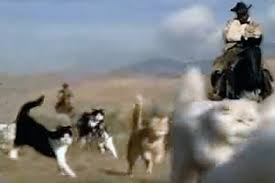 There was a seismic shift in plant physiology in the 80s and 90s with the enormously valuable input from molecular biology. This created a dilemma: should we join with the ASBMB and ANZSCDB as ‘ComBio’ or go it alone? The advantage of having a combined meeting is that there is a lot of overlap and people will only generally go to one generalist, national meeting. Also, being a bigger meeting, the trade fair is bigger, and ASPS receives important income from that. The downside is that we have to work hard to keep our identity, especially we ecophysiologists[1]. The new system of alternating a plant-focussed meeting with ComBio seems like an excellent solution and hats off to the Council who agreed to do this.
There was a seismic shift in plant physiology in the 80s and 90s with the enormously valuable input from molecular biology. This created a dilemma: should we join with the ASBMB and ANZSCDB as ‘ComBio’ or go it alone? The advantage of having a combined meeting is that there is a lot of overlap and people will only generally go to one generalist, national meeting. Also, being a bigger meeting, the trade fair is bigger, and ASPS receives important income from that. The downside is that we have to work hard to keep our identity, especially we ecophysiologists[1]. The new system of alternating a plant-focussed meeting with ComBio seems like an excellent solution and hats off to the Council who agreed to do this.
Next month is the first of the new-look ASPS meetings. Last time I went to ASPS at La Trobe it was on at the same time as ASBMB, which was in downtown Melbourne, and people were racing between the two by car. Crazy! I encourage you to come and learn stuff, give back, participate in some informal mentoring and make some life-long friends.

Prof Ros Gleadow, President ASPS 2010-2012 with cassava varieties and Bec Miller from University of Melbourne.
[1] The satellite “EcoFizz” meetings started by Susanne Schmidt, Mark Hovenden and me, and followed by Oula Ghanoum and David Tissue were great – does someone want to start those again?
Science meets Parliament is designed to bring together decision makers and Australia’s leading STEM professionals, to promote the role of science, technology, engineering and mathematics – and the valuable part these sectors can play in politics.
This will be the 20th year and ASPS will be represented by Tracey Cuin and Ricky Milne
You might remember an inquiry has been launched by the Standing Committee on Agriculture and Water Resources. It is of particular interest to members of ASPS and Tracey Cuin and Mike Haydon are preparing a submission. The link information for the inquiry can be found here and submissions close Thursday 28th November.
If you haven’t managed to send suggestions to the ASPS secretary Vanessa Melino (vanessa.melino@unimelb.edu.au) have a go now. This is a great opportunity for us to drive policy. I was at a workshop last week where it became evident how important this is. It it is for us to come up with clear policy with your suggestions of key priorities for plant/agricultural sciences in relation to the terms of reference: “The Committee will inquire into and report on, the opportunities and impediments to the primary production sectors realising their ambition to achieve a combined $100 billion value of production by 2030.” You also might find it interesting to read this discussion paper. 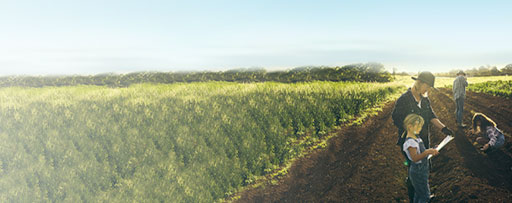 Image courtesy of KPMG
Image courtesy of KPMG
Celebration of Professor Sally Smith
A reminder there will be a gathering on October 25th 2019 to celebrate the life of Professor Sally Smith a long-standing member of ASPS who passed away suddenly on 13 September 2019.
Sally was Emeritus Professor in the School of Agriculture, Food and Wine, University of Adelaide. She was also Honorary Professor at the China Agricultural University and the Chinese Academy of Sciences.
Sally was a world authority on the mycorrhizal symbiosis between plants and fungi. She made outstanding contributions to our understanding of the structure of the plant-fungal interface, of nutrient transfer across it and of the molecular processes involved in forming and controlling the interface.
Sally completed her BA and PhD at Cambridge (1965) and her DSc at the University of Adelaide (1991). She held a personal Chair in Soil Science (1995) and was Director of the Centre for Plant Root Symbioses (1998). She was elected to the Australian Academy of Science in 2001. Just two months ago, Sally obtained an inaugural ‘Eminent Researcher’ award from the International Mycorrhiza Society. To celebrate her life there will be a gathering at Adelaide University’s Waite Institute, Beltana Café, McLeod House on the University of Adelaide Waite Campus, at 4pm on 25 October 2019. For further details and to RSVP please use this link. If you would like to share information, photos or memories as part of our ASPS tribute for Sally, please share these with Dr Stephanie Watts-Williams (stephanie.watts-williams@adelaide.edu.au), who is kindly leading our creation of an ASPS tribute.

Vale Professor Sarah “Sally” Smith
06 October 2019
Dear ASPS Members,
Professor Sarah “Sally” Smith
It is with sadness that we inform you that Sally Smith, a long-standing member of ASPS, passed away suddenly on 13 Sept 2019.
Sally was Emeritus Professor in the School of Agriculture, Food and Wine, University of Adelaide. She was also Honorary Professor at the China Agricultural University and the Chinese Academy of Sciences.
Sally was a world authority on the mycorrhizal symbiosis between plants and fungi. She made outstanding contributions to our understanding of the structure of the plant-fungal interface, of nutrient transfer across it and of the molecular processes involved in forming and controlling the interface.
Sally completed her BA and PhD at Cambridge (1965) and her DSc at the University of Adelaide (1991). She held a personal Chair in Soil Science (1995) and was Director of the Centre for Plant Root Symbioses (1998). She was elected to the Australian Academy of Science in 2001. Just two months ago, Sally obtained an inaugural ‘Eminent Researcher’ award from the International Mycorrhiza Society. To celebrate her life there will be a gathering at Adelaide University’s Waite Institute, Beltana Café, McLeod House on the University of Adelaide Waite Campus, at 4pm on 25 October 2019. For further details and to RSVP please use this link.
If you would like to share information, photos or memories as part of our ASPS tribute for Sally, please share these with Dr Stephanie Watts-Williams (stephanie.watts-williams@adelaide.edu.au), who is kindly leading our creation of an ASPS tribute.
Kind Regards,
Professor Kathleen Soole
President – Australian Society of Plant Scientists (www.asps.org.au)
Foreword by Stephanie Watts-Williams
I had the pleasure of first meeting Sal in 2014 on a visit to the Waite campus during my PhD. Since then, and especially since I moved to Adelaide more permanently in 2016, Sal became a fixture in my academic life. I looked forward to seeing her and Andrew at each fortnightly lab meeting – still amazed at how lucky we were to have her joining us long after her retirement. Sal was always generously giving feedback to myself and my PhD students, thereby helping to shape the research of young mycorrhiza research scientists, right up until her last months.
Below, I have collected tributes from ten of Sal’s colleagues, students, and friends from the last 30 years. There is a clear theme of warmth, mentorship and of ‘belonging’ when you were part of Sal’s lab. The photos that were sent to me also convey Sal’s legacy as a researcher – hard-working, well-respected, and collegial. She will long be remembered in the halls of the Taylor and Davies buildings, the Waite campus, and the wider scientific communities nationally and internationally.
Sandy Dickson – Volunteer Worker (1988), Technician (1989-1996), PhD student (1997-1999), Post-doctoral Research Fellow (2001-2005, 2007-2009)
Over the course of 30 years Sal has been my mentor, supervisor, colleague and above all, my friend. Her enthusiasm for mycorrhizal research inspired me to pursue a career in the field which I maintained for 20 years and still think about regularly. I enjoyed being her demonstrator for several workshops and we enjoyed many conferences together. She had a persistence of never giving up which also extended into her birdwatching (which she also encouraged me into), and we continued to tease each other on what we had recently seen. She will be sadly missed in the symbiotic community and never forgotten.
Evelina Facelli – Technician (1992), PhD student (1993 – 1999), Visiting researcher (1999 – 2006), Post-doctoral Fellow (2006 – 2010), colleague, mentee and friend (2010 onwards)
I started working with Sal as a technician in April 1992. Being a plant ecologist, I knew just a little about mycorrhizas but Sal’s contagious passion for their study soon seduced me. I found the lab meetings intellectually exhilarating. Sal would listen to each of us attentively, and provide advice on protocols, suggest readings, and importantly, made us all engage in the reasoning and learning process. So, towards the end of the year, I gathered courage and asked her to be my PhD supervisor. There was a problem: I could not commit to work long hours as I had two young kids. She readily accepted the situation, with understanding and encouragement: “I know…I have been there…, you want to run away at 3:30 to fetch the kids from school, like Cinderella, before your car turns into a pumpkin… go for it!”. She was an awe-inspiring woman. I admired her frankness (I was surprised how frank she dared to be!) and honesty. She was an outstanding supervisor. She could see the strengths in her students and foster and help to develop them, as well as helping to overcome our limitations. Personally, I found our regular meetings very intense, challenging and highly formative. She spotted the stones on the path but never removed them from me. In time, the intense meetings turned into friendly chats where she shared her experiences not only as a scientist but as a woman and a parent. I found support and solace having a chat with her during challenging moments in my life, her door was always open.
Her love for true science and nature had a profound influence on who I am now, and I know that through me she touched those who I love. It is a privilege having had her as a supervisor, a mentor, and a friend.
Patrick O’Connor – Honours (1993-1994) and PhD (1996-2001) student
I hear my university colleagues talk about how they supervise their post-graduate students. The meetings, discussions, structured exercises, workshops. What I rarely hear are the approaches that made Sally Smith such a fantastic mentor; a desire to understand each student, what they need and how they can be assisted to find their way into the field of research. For some students that meant helping with topic refinement, experimental design, writing skills, or time management. For me, Sally encouraged my desire for exploration of the enormous ballet of connected life. Sally added discipline and her own curiosity to my immature wonder at how the world is held together with trillions of small exchanges between parties trading in different currencies, different languages and different time zones. Sally helped me open up a view on the world of mycorrhiza that no one else could have because no one had her depth of knowledge and passion for the subject. What I learned about research from Sally has been fundamental in my journey as a researcher and consultant. I hope I am half as good as a mentor for others as Sally was for me.
Lingling Gao – Visiting Scholar (1997-1998), PhD student (1999-2002), Post-doctoral Fellow (2002-2003)
My family and I have found it hard to accept the loss of a most respected supervisor, a great personal mentor and a dear friend, Professor Sally Smith.
I had the privilege to meet Sally in 1997 when I first moved from China to Australia. Sally was my supervisor for 5 years, including one year for my visiting study, three years of my PhD and about one year of my postdoc. Sally guided and supported me though the most difficult period of time I had in Australia. She helped me obtain a scholarship which allowed me to carry out my PhD study. With her enormous encouragement and generous help, I was able to break through many barriers to succeed in my PhD and build up a strong foundation for my scientific career. Her love and kindness also earned my trust and respect as such in the past 20 years she had been the first person in my mind to speak to whenever I faced challenges. With Sally’s wisdom and mentorship, I was able to overcome those challenges. Sally not only changed my life but also changed the life of our entire family. She will stay in our hearts forever.
Tatsu Ezawa – Post-doctoral fellow (1998-2000)
In the late August 2019, I asked Sally to read my manuscript critically, and a week later, she returned it with lots of comments. Andrew Smith told me that it was the last professional activity in her life.
In early 1998, Sally was waiting for a long time to pick us up at Adelaide airport. It took more than 30 min to persuade Australian quarantine that my isolate (I brought from Japan) was clean enough, even though I had a permission letter. She smiled and whispered in a low tone, “They are ALWAYS like that.” Soon after I joined the lab, I found that, amazingly, she knew everything published in the past. “You should read Capaccio and Callow published in New Phytologist in 1982, which (a copy) you can find in the second drawer of the cabinet!” she said in a high tone. There were many Asians in the lab, and we always acknowledged her Queen’s English. We could understand what she was speaking, even if she was 20 m away from us. I miss her voice.
Yong-Guan Zhu – Post-doctoral researcher (1998-2002)
I was a postdoc working with Sally from June 1998 to Jan 2002, and I feel very fo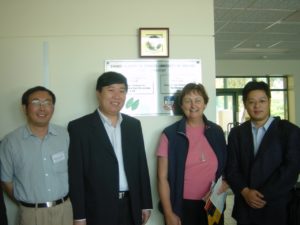 rtunate to have such a great mentor in the critical period of advancing my career. Sally was always encouraging and positive about what I did, even at experimental failure, which gave me much confidence in developing new ideas. English is my second language, and I have particularly benefited from Sally’s supervision in writing and editing research articles, and this even continued after I returned to China running my own lab, as she was our honorary professor at the Chinese Academy of Sciences, with the establishment of a joint lab.
rtunate to have such a great mentor in the critical period of advancing my career. Sally was always encouraging and positive about what I did, even at experimental failure, which gave me much confidence in developing new ideas. English is my second language, and I have particularly benefited from Sally’s supervision in writing and editing research articles, and this even continued after I returned to China running my own lab, as she was our honorary professor at the Chinese Academy of Sciences, with the establishment of a joint lab.
I am forever grateful to Sally’s excellent supervision and inspiration, and I will certainly pass this on to future generations of scientists through my own students. Sally lives in our minds forever.
Tim Cavagnaro – PhD student (1998-2001), Postdoctoral researcher (2001-2003)
In the final semester of my undergraduate studies I took Sally’s course in Soil Biology and Biochemistry. She spoke on the topic of mycorrhizas (and indeed all things soil biology) with such enthusiasm and excitement that I was inspired to pursue a PhD under her supervision. Sally had an unparalleled knowledge of the literature, but more than that, she was able to explain its significance and meaning to any and all. She taught me many lessons over the years, including statistical significance and biological significance are not synonymous, nor are expression of the transporters and fluxes across the membranes, and that when things when things go wrong it is all part of “life’s rich pageant”. I fear that Sally often despaired of my writing (and excessive use of commas), but she patiently worked with me to improve in this and other areas. Sally continued to support me well beyond my time as a student and postdoc in the lab – she was always happy to offer advice, and if ever in doubt I ask myself the question: What would Sally do…? The last time I saw Sally was in our regular lab meeting – as always, she shared sage advice with the group and encouraged students in their work. I think the most the most important lessons I learnt from Sally were about the type of scientist I aspire to be. Sally was a mentor, trailblazer, inspiration and above all a friend. Having read the words of my friends and colleagues above, I know I am not alone in this sentiment.
Liz Farquharson (nee Drew) – PhD student (1999-2002)
SE Smith
S is for Sal. From students to professors she was almost always ‘just’ Sal. I have many fond memories of sharing lunch and conversation with Sally and Andrew Smith in the soils tea room through my PhD years.
E is for Enthusiasm. In all she did from lectures in soil biology, to supervision of students or bird watching camping trips, it was fantastic to spur you into action.
S is for Science & Spelling! Sally valued ideas, critical thinking, good science and great writing. Her editing skills were impressive and she could turn around a thesis chapter in one weekend!
M is Mycorrhiza (of course!) – Her contribution to this field of research will endure.
I is for Intellect. Sharp and savvy, always thinking, always a question and a memory of the literature like no other. Sally could pull a reference from 20 years ago seemingly out of thin air and provide full details almost to page number.
T is for Teacher. Sally taught me how to be a researcher; how to go about asking the right questions and then how to go about finding the answers to them.
H is for honoured. Sally was a highly valued member of the University of Adelaide and the wider scientific community. Her influence in shaping the careers of so many is a tribute to her value, as a fellow human and as the brilliant researcher she was. We can each honour her life when we put in to practice what we have learnt from her.
Our deepest condolences go to Professor Andrew Smith and their two daughters.
Jean-Patrick Toussaint – PhD student (2004-2008)
In 2002, with my Masters in hands, I timidly but boldly emailed Sally Smith. Not only did Sally accept that I come visit her lab for 3 months (from Dec ’02-Feb ’03), she also provided support and much guidance during that time. So, almost two years later, in August 2004, I went back to Australia to start my PhD in Sally’s lab; she gave me the flexibility and freedom to explore my creative ideas, challenged me to define the best protocols I needed to test my hypotheses and provided me with a wealth of knowledge on the basic understanding of this field of plant physiology;
Of course, Sally was a brilliant academic – but she was also an exceptional female mentor and role model: she provided strong guidance to students she took under her wing, doing her best to offer as many professional/speaking experiences as possible; she was a force to reckon with, who would not shy away from a prickly scientific conversation or dispute…and certainly not from male figures who would think a bit too much of themselves; moreover, she was ruthless with English grammar;
It is hard to capture into words all of Sal’s legacy – not only for the academic world, but also for the person that I became; she has very much imprinted my own personal and professional journey, and I could have never thanked her enough for everything she’s done and was.
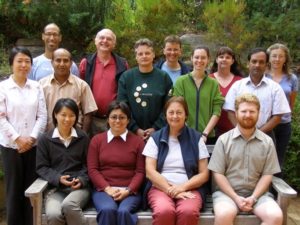
Rebecca and Jamus Stonor – Technical assistant and lab manager (Rebecca; 2005-2013)
The last time I saw Sally she was spritely and full of life. She threw her (hefty) bird watching telescope and tripod over her shoulder and we marched over the sand dunes to the beach… Sally to me was less of a supervisor, although she was that too, and more of a devoted mentor. She was an inspiring role model, especially for a young woman in science, but above all else and especially later I considered her to be a friend. Despite her high position and achievements she was always interested in what was going on in my life; how the kids were and how well our tomatoes were growing in the veggie garden at home. Over coffee in the tearoom we had endless conversations about the lack of rain, the state of the environment, birds and flowers and plants thriving or barely surviving in our gardens. I still can’t believe she’s no longer with us, but feel immense gratitude for having her in my life. She is gone now from this Earth, but there are many lovely reminders of her; the special irises she gave us will bloom every spring in our garden and I will always remember Sal.
Last chance ASPS2019 poster abstract submission, Phytogen and journal updates
30 September 2019
Dear ASPS members,
Just a reminder to submit your ASPS2019 poster abstract before October.
Submit your abstract HERE
Register for ASPS2019 HERE
View the draft ASPS2019 program HERE
If you haven’t already read the September edition of Phytogen it can be viewed HERE.
The International Journal of Molecular Sciences (IJMS, ISSN 1422-0067, Impact Factor: 4.183) is an open access journal which provides an advanced forum for molecular studies in biology, chemistry and biophysics. Our aim is to provide rigorous peer review and enable rapid publication of cutting-edge research to educate and inspire the scientific community worldwide. IJMS is indexed by the Science Citation Index Expanded (Web of Science), MEDLINE (PubMed) and other important databases. Manuscripts are peer-reviewed and a first decision provided to authors approximately 17 days after submission; acceptance to publication is undertaken in 4.9 days (median values for papers published in this journal in the second half of 2018).
Plants (ISSN 2223-7747; Impact Factor: 2.632) is an open access journal of plant science. Our aim is to encourage scientists and research groups to publish theoretical and experimental results of research in all fundamental and applied fields of plant science. Plants is indexed by the Science Citation Index Expanded (Web of Science), BIOSIS Previews (Clarivate Analytics), Scopus and other important databases. Citations are available in PubMed and full-text are archived in PubMed Central. Manuscripts are peer-reviewed and a first decision provided to authors approximately 13.7 days after submission; acceptance to publication is undertaken in 5.8 days (median values for papers published in 2018).
Your suggestions of key priorities for plant/agricultural sciences
24 September 2019
Dear ASPS members,
An inquiry has been launched by the Standing Committee on Agriculture and Water Resources.
We think that this topic is of particular interest to members of ASPS and as such we are preparing a submission collectively. This will be led by Dr Tracey Cuin (UTAS) and Dr Mike Haydon (UoM).
The link information for the inquiry can be found here and submissions close on Monday the 14th of October. (https://www.aph.gov.au/Parliamentary_Business/Committees/House/Standing_Committee_on_Agriculture_and_Water_Resources/Agriculturegrowth)
Please respond to the ASPS secretary Vanessa Melino (vanessa.melino@unimelb.edu.au) with your suggestions of key priorities for plant/agricultural sciences in relation to the terms of reference: “The Committee will inquire into and report on, the opportunities and impediments to the primary production sectors realising their ambition to achieve a combined $100 billion value of production by 2030.”
Please send your comments by Monday 30th of September.
Kind Regards,
Professor Kathleen Soole
President – Australian Society of Plant Scientists (www.asps.org.au)
Recent Posts
Tags
Archives
- June 2025
- May 2025
- April 2025
- March 2025
- February 2025
- January 2025
- December 2024
- November 2024
- October 2024
- September 2024
- August 2024
- July 2024
- June 2024
- May 2024
- April 2024
- February 2024
- January 2024
- November 2023
- October 2023
- September 2023
- August 2023
- July 2023
- June 2023
- May 2023
- April 2023
- March 2023
- February 2023
- December 2022
- November 2022
- October 2022
- September 2022
- August 2022
- July 2022
- June 2022
- May 2022
- April 2022
- March 2022
- February 2022
- January 2022
- December 2021
- November 2021
- October 2021
- September 2021
- August 2021
- July 2021
- June 2021
- April 2021
- March 2021
- February 2021
- January 2021
- December 2020
- November 2020
- October 2020
- September 2020
- August 2020
- July 2020
- June 2020
- May 2020
- April 2020
- March 2020
- February 2020
- January 2020
- December 2019
- November 2019
- October 2019
- September 2019
- August 2019
- July 2019
- June 2019
- May 2019
- April 2019
- March 2019
- February 2019
- January 2019
- December 2018
- November 2018
- October 2018
- September 2018
- August 2018
- July 2018
- June 2018
- May 2018
- April 2018
- March 2018
- February 2018
- January 2018
- December 2017
- November 2017
- October 2017
- September 2017
- August 2017
- July 2017
- June 2017
- May 2017
- April 2017
- March 2017
- February 2017
- January 2017
- December 2016
- November 2016
- October 2016
- September 2016
- August 2016
- July 2016
- June 2016
- May 2016
- April 2016
- March 2016
- February 2016
- January 2016
- December 2015
- November 2015
- October 2015
- September 2015
- August 2015
- July 2015
- June 2015
- May 2015
- April 2015
- March 2015
- February 2015
- January 2015
- December 2014
- November 2014
- October 2014
- September 2014
- August 2014
- July 2014
- June 2014
Copyright 2017 Australian Society of Plant Scientists Disclaimer & Privacy
Website by Michael Major Media

